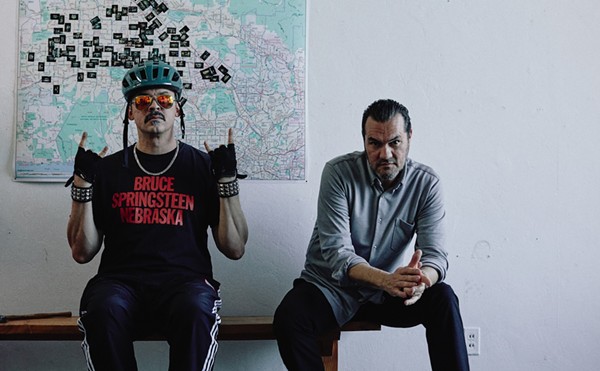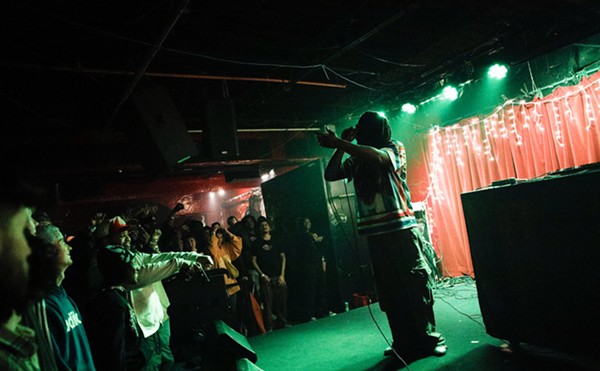"You do things to be different," he explains. "Things catch on. But I have friends now who have no tattoos, and I think that's so much more of a statement. People now start on their neck and work down, and I think, 'Man, I wish I didn't have any.'"
Presumably, this is not Ness's greatest regret. His is the life of bona fide punk-rocker myth, rife with bar fights and broken relationships and altercations with the law. Heroin addiction, just for variety. But somehow, Ness survived, pouring it all into Social D, a Southern California punk institution now twentysomething years old.
Yes, after twentysomething years, you are officially old.
The MO on the D has always been something to the effect of "no-bullshit rock in need of more bullshit." But bust out the cultural microscope, and you'll discover a band years ahead of its time. Seriously. Starting with 1983's Mommy's Little Monster, Ness and the boys developed a brand of hard-charging punk vitriol that assuaged the leather-jacket mafia, yet hinted at something deeper. Something more personal, more introspective, more narrative-driven, more . . . country.
Social Distortion as alt-country pioneers? Believe it, bub. Here's a band that covered Johnny Cash's "Ring of Fire" way back in the Dark Ages (1990). Wilco, my ass.
"I can't take all the credit for it," Ness wisely notes. "But it's so funny -- when we first did 'Ring of Fire,' so many people would say, 'I can't believe you guys did a country song.' Sure enough, 10 years later, there's rockabilly, country, and punk all being kinda connected as a phenomenon now."
It's hard to deny: Mike Ness is talking like your grandpa, all back-in-my-day and wistful. But depending on your temperament in the '80s and early '90s, maybe he was a (grand)father figure. Social D records like 1990's self-titled opus and '95's Prison Bound have worked themselves into the countercultural fabric, with Ness's gravel-chomping croon delivering his down-and-out-and-gettin'-drunk-and-whuppin'-ass tales of woe. For kids who grew up in the suburbs and never quite tasted that Hank Williams sort of lifestyle aesthetic, Ness lived it for you, edited it down, and threw three-chord punk changes over it for good measure.
You need not have suffered an awful childhood or battled heroin addiction or thrown someone through a plate-glass window to get it.
"I don't think it's a prerequisite," Ness says. "Everyone has their own red wagon they're pulling. They may not have gone to the extremes, but that doesn't mean they can't identify with a certain emotion. I really like writing interpretively, so people can get whatever they want out of it."
Ness does not shy away from the word "junkie" nor his personal experience with the term. He did it, he suffered for it, he survived it. And it all has profound gravity at this moment, what with Alice in Chains singer Layne Staley recently becoming heroin's highest-profile casualty since Kurt Cobain.
Ness will pull no punches as to how he avoided such a fate: "Yeah, I was lucky," he says. "I kinda hit bottom long before I had any level of success. Had I had that kind of money, I surely would've been dead. You've got people who run for you and cover up for you, people at your beck and call. It's still very tragic and very sad that an addict dies from this and never gets to experience life on the other side. A clean, productive, meaningful life. It's always sad."
This is the life Mike Ness is leading, and he's still leading Social Distortion as a result. Though the band hasn't released a proper studio album since 1996's surprisingly acerbic White Light, White Heat, White Trash, interest in Social Distortion remains strong, thanks to a live record (Live at the Roxy), a pair of Ness solo albums (acoustic dirges, Dylan covers), and sporadic touring. And you can expect a new record next year.
"It's gonna be a great record," Nesstradamus predicts. He says he's "writing about the spirit of when we were young, what it was like starting a band, and what it was about. I think it's important that these kids know that you couldn't just go to the mall and buy your Doc Martens -- if you walked down the street that way, you were gonna get into an altercation, no doubt. Back then, it was a revolution."
Yeah, all right, old-timer. Punk rock is like this now -- a nostalgia trip, divided between those who glorify and romanticize it and those who were actually there. However reflective and idealistic he remains, Ness belongs in the latter category.
"I don't like the fact that they say that punk rockers weren't very talented musicians. Granted, you didn't have to be a 12-year music major, but neither was Howlin' Wolf or Woody Guthrie. They had something to say. I always saw the connection between punk music and roots music as being very working-class, being very honest, very emotional. Not a trendy style that kinda catches on."
A final note -- we'd be remiss not to mention the abrupt and devastating death of original Social Distortion guitarist Dennis Dannell, from a brain aneurysm in February 2000. Of all the calamity to befall the band, this was nearly the knockout punch. Ness admits as much.
"Oh yeah, absolutely. That was kinda the general consensus. I really had to do some soul-searching," he says.
Obviously, Ness changed his mind.
"Me and him started this band 23 years ago in a garage, and we told each other we'd take it to the end. I don't think he'd want me to quit. If it was me that died, I wouldn't want him to quit and do something else. Hell no.
"It's good inspiration. Death has a very powerful effect on people. It's painful and it hurts, but every time I've gone through pain or hurt, I've been able to regain strength from it and move forward."
Spoken like a man with "love" and "pain" tattooed on his hands. Moral: When life hands you lemons, throw life through a plate-glass window.













